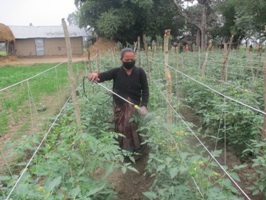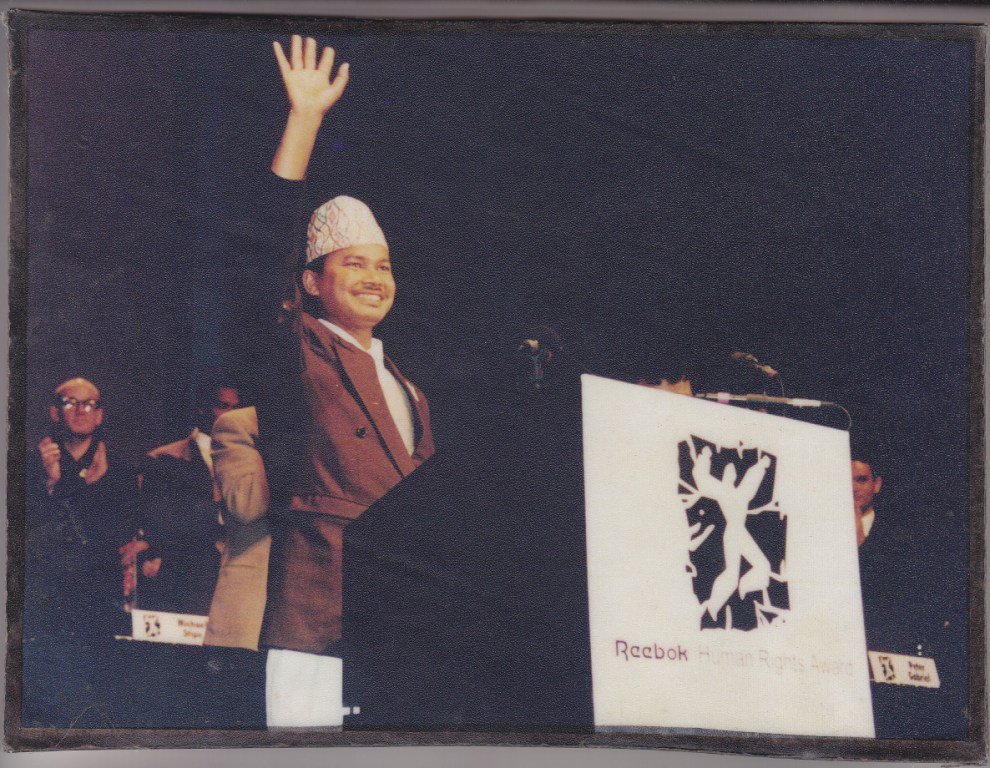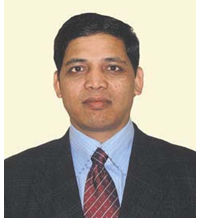Feature Stories
Transformation of House Wife to Agricultural Entrepreneur
Mrs. Rishaniya Tharu lives in Phattepur VDC- 8 Kamaiya dada village, Banke district, Nepal with her husband and two sons. She is literate women and she did not get opportunity to study in formal school in her life. Her family depends on agriculture which is their main source of subsistence. They have altogether 5 Katha of their own land (0.16 hectare) and they cultivate vegetable in 7 Katha including in two Katha rented land. Mrs. Rishaniya Tharu joined with the Samjhana Vegetable Production Groups under the Initiative of Agriculture Productivity and Commercialization (IAPAC) project on 04-September-2014 (2071/05/12 BS).
Mrs. Rishaniya Tharu state that “the agricultural productivity was not sufficient for her family and hardly managed food for a year as a result they were suffering from food insecurity. Despite working from early morning to late evening in agricultural field and also her husband used to work as wage labourer at the local market. Before the implementation of the IAPAC project, we had been paddy and vegetables cultivation with small a rea of our own land from old/traditional practices so the production was very less. We weren’t informed about new agricultural technology and improved packages of practice to grow high value commercial crops. Due to lack of information and knowledge many farmers from our village were migrated to India as well as other country and work as a labourer. Some of them went to Nepalgunj to earn money for their livelihood”.
rea of our own land from old/traditional practices so the production was very less. We weren’t informed about new agricultural technology and improved packages of practice to grow high value commercial crops. Due to lack of information and knowledge many farmers from our village were migrated to India as well as other country and work as a labourer. Some of them went to Nepalgunj to earn money for their livelihood”.
Mrs. Rishaniya remembered her past days – “we used to buy stale vegetables from Indian market because of low vegetables production in our agriculture field. We had tough life in past and difficult to fulfil our family needs and led problems in child education and also for treatment once we get sick”.
Mrs. Rishaniya further explained that ” I got suggestion by agricultural technician from IAPAC project to participate in a training to improved vegetable production technology as well as production of off-seasonal vegetable, market stipulated vegetable production and access to credit etc. As per suggestion, I had participated in training and demonstration activities like i.e. nursery management training, plant protection/IPM training and post harvesting training. The tools, materials and improved agriculture inputs are demonstrated like; nylon net demonstration over vegetable nursery beds, soil solarisation technique, bio pesticides, coco pit, plastic tray, Jhoholmal (liquid fertilizer) making process demonstration and various field level activities and started to cultivate vegetable with improved technology, adopting and practicing improved technology like; cultivation, trellising, composting, preparing and using residential pesticides etc.
Before participating in above training we had old practice to grow vegetables and directly spreading the seeds for nursery but now we had been spreading seeds line by line and use modern technology so the production is high. I didn’t know about the solar lift pump before but now I use solar pump and Dhiki Pump for irrigation and it helps to grow healthy and fresh vegetables which attract all of us to keep farming. Now it became easy for us to survive us and at least managed food for whole year, she said”.
The entire family members are engaged in this occupation saving some money and eating fresh vegetables which helps to improve our health due to nutritional food consumption and it will be the regular source of income. Perhaps, this all are from our hardworking and efforts but IAPAC program gives us th is opportunity in our own landlord.” I sold vegetable and vegetable seeds and make income NRS 40,000 a year. Before the implementation of the IAPAC project, I had taken loan but now I’ve already payed. Now no need to taken loan from micro finance institution and cooperatives, I can easily fulfil our needs from our own vegetable production.
is opportunity in our own landlord.” I sold vegetable and vegetable seeds and make income NRS 40,000 a year. Before the implementation of the IAPAC project, I had taken loan but now I’ve already payed. Now no need to taken loan from micro finance institution and cooperatives, I can easily fulfil our needs from our own vegetable production.
Now we are consuming fresh vegetables and children’s are going to public as well as private school, family members are not working as a wage labours, not migrating to India anymore. Healthcare is also affordable. Our social status in the community is increased. The District Agriculture Development Office (DADO) staffs also visit to observe our vegetable farm. The DADO also supports vegetable seed, pesticide, and plastic and sprayer tank.
Asking further future thought and plan of Mrs. Rishaniya – she said “I have planned to continue vegetable production to make commercialization even IAPAC project phase over but I will survive my work. If possible in the future I want to learn more about new technology to cultivation vegetable in large scale”. She is very famous agricultural entrepreneur in her community.
(This Success Story is taken from BASE IAPAC Quarterly Report)


